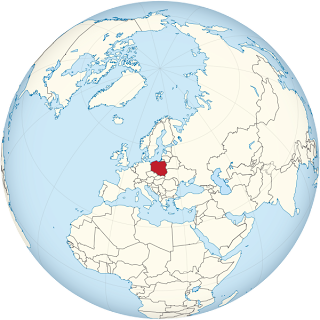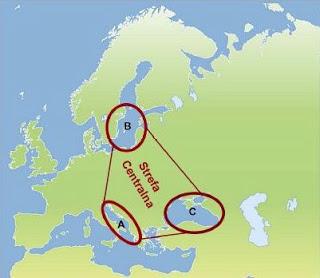 As noted by Romanian philosopher and historian of religions Mircea Eliade, the man of archaic societies sought to live as near as possible to the center of the world, often considering his country as laying at the midpoint of the earth. Residues of this conception are still visible, whereas the Chinese, for instance, call their country Zhōngguó, literally the “Middle Kingdom.” From a geopolitical point of view, the concept of “centrality” can be applied to several countries and regions throughout the world, among those Poland, which occupies a central position on the basis of both geographical and cultural features.
The main natural elements of Polish geography are the Vistula River, the Tatra Mountains and the Baltic Sea. The Vistula, which has been described as the backbone of Poland, passes through several large Polish cities, including Cracow, Warsaw, Torun and Gdansk, thereby being a strong element of the country’s national identity. The Tatra, which are the highest mountain range in the Carpathian Mountains, separates Poland from Slovakia. Nevertheless, from a wider perspective, by running from the Polish-Slovakian border up to the heart of Romania, the Carpathians actually makes Poland part of a geopolitical space which includes the composite Balkan region, bounded on the south-west by the Adriatic Sea, and east by the Black Sea.
As noted by Romanian philosopher and historian of religions Mircea Eliade, the man of archaic societies sought to live as near as possible to the center of the world, often considering his country as laying at the midpoint of the earth. Residues of this conception are still visible, whereas the Chinese, for instance, call their country Zhōngguó, literally the “Middle Kingdom.” From a geopolitical point of view, the concept of “centrality” can be applied to several countries and regions throughout the world, among those Poland, which occupies a central position on the basis of both geographical and cultural features.
The main natural elements of Polish geography are the Vistula River, the Tatra Mountains and the Baltic Sea. The Vistula, which has been described as the backbone of Poland, passes through several large Polish cities, including Cracow, Warsaw, Torun and Gdansk, thereby being a strong element of the country’s national identity. The Tatra, which are the highest mountain range in the Carpathian Mountains, separates Poland from Slovakia. Nevertheless, from a wider perspective, by running from the Polish-Slovakian border up to the heart of Romania, the Carpathians actually makes Poland part of a geopolitical space which includes the composite Balkan region, bounded on the south-west by the Adriatic Sea, and east by the Black Sea.
On the north, access to the Baltic puts Poland in communication with Scandinavia, that is, with the northern end of Europe. However, while geography makes Poland the center of a north-south axis virtually connecting the continent from the Arctic Ocean to the Mediterranean Sea, cultural features provide the country a centrality of global connotations. From a cultural point of view, the Polish people is in fact characterized by its belonging to the Slavic world – which makes Poland part of a Eurasian space stretching from Prague to Vladivostok – and the Roman Catholic faith, by virtue of which Poles belongs to a religious community stretching from Central Europe to Portugal and beyond so as to include the entire Ibero-America. THE CENTRAL ZONE (STREFA CENTRALNA) OF THE MIĘDZYMORZE
 The coexistence ofthe Slavic and Catholic identities turns Poland into a point of junction between Western and Eastern Christianity, as well as between the Latin, Germanic and Slavic worlds. In the interwar period, the geopolitical centrality of Poland was emphasized by Polish national hero Józef Piłsudski. The father of the Second Polish Republic advocated for Warsaw the mission to create a federation between the Baltic and Black Seas – hence the name of the concept, Międzymorze, “Between-seas” – aimed at reuniting the nations once part of the Polish-Lithuanian Commonwealth, namely Poland, Lithuania, Belarus and Ukraine, with the possibility of a further expansion southwards to the Balkans.
The failure of the project, followed by German and then Soviet occupation of the country at the end of World War Two, stopped Poland from taking advantage of its crucial geopolitical location for its own interests. Therefore, throughout the Cold War, Warsaw was just a pawn in Moscow’s grand strategy against the West. However, the end of the bipolar confrontation, far from turning Poland into a regional power with an autonomous geopolitical identity, just resulted in a change of bloc: former Soviet sentinel on the Baltic Sea, Poland has rapidly become a NATO outpost against Russia and Belarus, that are the key members of the post-Soviet Collective Security Treaty Organization (CSTO).
More than two decades after the end of the Soviet yoke, the main objective of Warsaw’s foreign policy should be now to reconcile its Atlantic membership – which inevitablymakes it aperiphery of the Euro-American establishment – with its continental identity, which sees it as the center of Europe. Only through a redefinition of its geopolitical identity in this sense, Poland would achieve the necessary independence to become a real regional power, carrying out the function, more compliant to its geography and culture, of a bridge between Europe and Russia, that is between the West, as it is conceived, and the Eurasian bloc rising on its eastern borders.
The coexistence ofthe Slavic and Catholic identities turns Poland into a point of junction between Western and Eastern Christianity, as well as between the Latin, Germanic and Slavic worlds. In the interwar period, the geopolitical centrality of Poland was emphasized by Polish national hero Józef Piłsudski. The father of the Second Polish Republic advocated for Warsaw the mission to create a federation between the Baltic and Black Seas – hence the name of the concept, Międzymorze, “Between-seas” – aimed at reuniting the nations once part of the Polish-Lithuanian Commonwealth, namely Poland, Lithuania, Belarus and Ukraine, with the possibility of a further expansion southwards to the Balkans.
The failure of the project, followed by German and then Soviet occupation of the country at the end of World War Two, stopped Poland from taking advantage of its crucial geopolitical location for its own interests. Therefore, throughout the Cold War, Warsaw was just a pawn in Moscow’s grand strategy against the West. However, the end of the bipolar confrontation, far from turning Poland into a regional power with an autonomous geopolitical identity, just resulted in a change of bloc: former Soviet sentinel on the Baltic Sea, Poland has rapidly become a NATO outpost against Russia and Belarus, that are the key members of the post-Soviet Collective Security Treaty Organization (CSTO).
More than two decades after the end of the Soviet yoke, the main objective of Warsaw’s foreign policy should be now to reconcile its Atlantic membership – which inevitablymakes it aperiphery of the Euro-American establishment – with its continental identity, which sees it as the center of Europe. Only through a redefinition of its geopolitical identity in this sense, Poland would achieve the necessary independence to become a real regional power, carrying out the function, more compliant to its geography and culture, of a bridge between Europe and Russia, that is between the West, as it is conceived, and the Eurasian bloc rising on its eastern borders.

